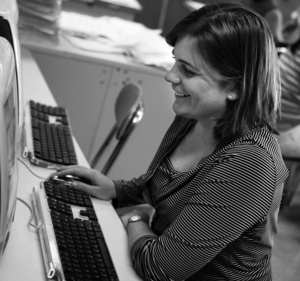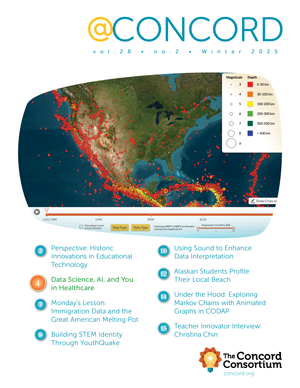Technology and Effective Professional Development
Information technologies—networked computers, software, and online communities—can provide incredible new resources for professional development.
What is effective professional development?
Too often, professional development focuses separately on either increasing teacher content knowledge or on abstract teaching methods. A common approach is to take graduate level courses in a discipline. The problem with this is that the impact on teaching is so indirect. A brilliant mathematician can fail as a teacher if she lacks an understanding of pedagogy. Research shows no measurable gains in student performance for this approach.
The other common strategy is to focus on general educational ideas and strategies. This approach can be helpful, but content must also be addressed. A cognitive scientist who understands student learning theories will fall short without content knowledge. Furthermore, unless educational techniques are embedded in a teacher’s instruction, it is difficult for most teachers to put educational theory into practice.
The golden grail for professional development programs is proof that they result in student gains. The few programs that meet this test invariably focus teachers on learning to use student materials they can immediately apply to their instruction. If the student materials are high quality and the teacher professional development is effective, student learning increases. These successful programs focus on the content and pedagogy embodied in the materials. This finding has led to the idea that professional development should focus on “pedagogical content knowledge,” or PCK, that is based on student materials. A growing literature, especially in science, technology, engineering, and math (STEM) education, suggests that teacher PCK has a positive impact on student learning and that experience enacting inquiry curricula in the classroom is critically important to the development of teacher PCK.
Technology-based materials
The Concord Consortium develops technology that allows teachers and students to tackle difficult concepts in new ways. By creating new representations and models for understanding science and math, we provide teachers with innovative tools made possible by technology. However, the technology itself can be an obstacle for many teachers.
Our materials feature student investigations of real events with probes, explorations of highly interactive models, and exploration of online databases and images. A substantial body of research shows that probeware can speed student learning of complex relationships in math and science. Similarly, computational models and simulations allow students to understand through exploration the behavior and mathematics of systems that are difficult to understand by other means. This use of technology involves new content and requires extensive use of inquiry-based learning.
Many of our materials for students are designed for technology-rich classrooms, which is clearly the direction for STEM education at all levels. Using computer-based student materials in professional development has many advantages: 1) teachers learn content and pedagogy by customizing the student materials; 2) the materials can be used immediately in class; 3) the materials can use the full power of technology to support learning based on guided inquiry; 4) teachers can continue their professional development using the detailed feedback provided by the software; and 5) professional development efforts can assess their impacts by electronically tracking the use of the student materials and measuring student gains.
A feature of our approach to professional development is teacher customization of student materials, a uniquely powerful way of implementing PCK professional development (see also “Community-Authored Resources for Education” on pages 6-7). To modify an activity, teachers need to consider the content and pedagogy of the original activity and how this might better meet the needs of their students and fit their curriculum. In the process of planning how to customize the materials, teachers learn the content more deeply than they might by just reading about it, and they think about the inquiry-based learning strategies that are built into the activities. They acquire pedagogical content knowledge that improves the materials and can improve their overall teaching prowess.
A recent article provides a theoretical basis for our approach.1 The authors extend the PCK framework to include technological knowledge, which they call “technological pedagogical content knowledge” (TPCK). The authors assert that: “TPCK…requires an understanding of the representation of concepts using technologies [and] pedagogical techniques that use technologies in constructive ways to teach content” as well as PCK strategies.
Using technology to deliver professional development
The Concord Consortium has over a decade of leadership in developing new approaches to online professional development for STEM teachers. When launched in 1996, the International Netcourse Teacher Enhancement Coalition (INTEC) was one of the first web-based online professional development programs. Funded by the National Science Foundation, INTEC created and delivered a 120-hour online, credit-bearing graduate-level professional development course to teams of teachers from school districts across the country. INTEC’s objective was to assist the systemic improvement in math and science instruction by helping mathematics and science teachers understand and use inquiry as an instructional tool. Over 800 educators participated. As a result of INTEC, we developed the Concord e-Learning Model, a successful course on online facilitation, and a supporting text that remains widely used today.
The success of INTEC led the Concord Consortium to develop the Virtual High School (VHS), which in 1997 was one of the first online high schools. VHS remains the only virtual high school that uses a cooperative design and relies entirely on school-based teachers to develop and facilitate its courses. This highly successful program has made the transition to an independent nonprofit supported entirely from school membership fees. It is fully accredited and currently offers over 200 semester-long courses in all disciplines to students worldwide.
The keys to the success of VHS are two online courses, one on course facilitation and one on course design. These two courses have been offered dozens of times by VHS and regularly receive high praise from participants who often say that they are the most rigorous and rewarding professional development experiences of their lives.
In 2000 we launched Seeing Math, an innovative online professional development project. The Seeing Math project developed 21 online short courses for teachers of mathematics at the upper elementary and middle school levels. Each course features a video case study, using videos of real teachers in real classrooms. The focus of each video is teacher-to-student and student-to-student interactions, including teachers’ questioning strategies that elicit student thinking and help make that thinking explicit. Additional video commentaries from math specialists highlight areas of student misconceptions and insights. Activities using interactive software provide course participants with a math challenge, so they explore the same content as students in the videos. Participants are asked to observe carefully their own processes as they work towards a mathematical solution; they share their processes in discussions with colleagues, and are thus exposed to a wider framework for understanding different problem-solving approaches, including those used by their own students. Seeing Math courses are available from PBS TeacherLine and Teachscape.

The Seeing Math experience with student materials and software led to the Information Technology in Science Instruction (ITSI) project in 2006. ITSI provides a professional development experience with optional graduate credit for secondary science teachers using a blended model that includes summer workshops and academic year online courses. ITSI prepares diverse students for careers in information technologies by engaging them in exciting, inquiry-based science projects that use computational models and real-time data acquisition. The project provides over 126 hours of lab-based, credit-bearing activities for 90 teachers and full support for classroom implementation.
Our professional development model is also used in the Rhode Island Information Technology Experiences for Students and Teachers project that helps secondary teachers in Physics First schools to incorporate interactive computer models to support a deep understanding of the molecular basis of science. This decade of experience with online professional development led to a collaboration with Rhode Island institutions to create the Rhode Island Technology Enhanced Science project. This $12.5 million project, just getting underway, will reach all Rhode Island secondary science teachers with short courses using a blended professional development model based on technology-rich student materials. A large number of short courses will give teachers flexibility in meeting their specific needs.
As student materials take more advantage of the unique power of technology, professional development must change. Technology supports that change by providing teachers with new ways to enhance their knowledge and teaching skills.
1. Mishra, P. & Koehler, M. J. (2006). Technological pedagogical content knowledge: A framework for teacher knowledge. The Teachers College Record, 108(38), 1017-1054.
